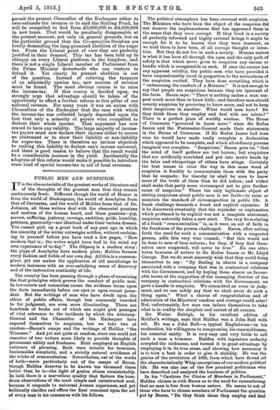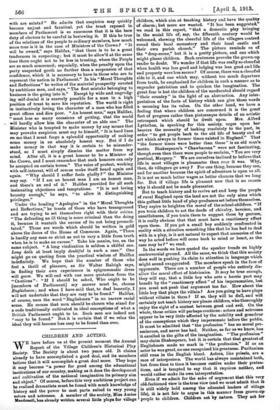PUBLIC MEN AND SUSPICION.
IT is the characteristic of the greatest works of literature and of the thoughts of the greatest men that they remain continuously fresh. Different though the world of Homer is Irons the world of Shakespeare, the world of Aeschylus from that of Cervantes, and the world of Moliere from that of Dr. Johnson, all those writers deal with the elemental passions and motives of the human heart, and these passions—joy, sorrow, suffering, jealousy, revenge, ambition, pride, humility, pretence, generosity—are identical under their various dresses. You cannot pick up a great book of any past age, in which the sincerity of the writer outweighs artifice, without exclaim- ing to yourself before you have read a few pages, "How modern that is ; the writer might have had in his mind my own experience of to-day." The Odyssey is a modern story ; the plays of Aeschylus have modern plots; Moliere foresaw zvery fashion and foible of our own day. All this is a common- place, yet one makes the application of old moralizings to modern instances with an ever-satisfying sense of discovery and of the instructive continuity of life.
The country has been passing through a phase of examining the first principles which govern the conduct of public men. In law-courts and committee rooms the evidence turns upon the facts immediately before our eyes or upon recent prece- dent. But the writings of men who have dwelt upon the ethics of public affairs, though less commonly resorted to for judgment, are even more illuminating. There are hundreds of books out of which one might pick passages of vital relevance to the incidents by which the Attorney- General and the Chancellor of the Exchequer have exposed themselves to suspicion, but we take two at random—Bacon's essays and the writings of Halifax "the Trimmer." And yet not quite at random, since one could not conceive of two writers more likely to provide thoughts of permanent utility and freshness. Both employed an English reticence of phrasing. Both were notable for terseness, businesslike simplicity, and a strictly natural avoidance of the tricks of ornamentation. Nevertheless, out of the works of both—more particularly out of the essays of Bacon, though Halifax deserves to be known ten thousand times better than he is—the light of genius shines unmistakably. In both there is a marvellous quality that flatters the hum- drum observations of the most simple and uninstructed soul, because it responds to universal .human experience, and yet brilliantly clarifies and offers the final comment upon the act of every mania his commerce with his fellows. The political atmosphere has been overcast with suspicion. The Ministers who have been the object of the suspicion did not deserve the unpleasantness that has oppressed them in the sense that they were corrupt. If they lived in a society of perfectly informed and highly rational beings it might be enough for it to be known that they were innocent, as we hold them to have been, of all corrupt thought or inten- tion. But they do not live in such a society. Human nature is what it has been all through the ages, and the only path of safety is that which never gives to suspicion any excuse or handle which is recognizable as such. If once the excuse has any apparent validity, the public men who have provided it have unquestionably erred in proportion to the naturalness of the suspicion excited. They have done something which is "unbecoming the conduct of a Minister." It is not enough to say that people are suspicious because they are ignorant of the facts. Bacon says : "There is nothing makes a man sus- pect much more than to know little ; and therefore men should remedy suspicion by procuring to know more, and not to keep their suspicions in smother. What would men have ? Do they think those they employ and deal with are saints ? " There is a perfect piece of worldly wisdom. The House of Commons "procured to know more" when Sir Rufus Isaacs and the Postmaster-General made their statements in the House of Commons. If Sir Rufus Isaacs had been wise he would have made really complete a declaration which appeared to be complete, and which all ordinary persons imagined was complete. "Suspicions," Bacon goes on, "that the mind of itself gathers are but buzzes ; but suspicions that are artificially nourished and put into men's heads by the tales and whisperings of others have stings. Certainly the best means to clear the way in this same wood of suspicion is frankly to communicate them with the party that he suspects : for thereby he shall be sure to know more of the truth of them than he did before; and withal shall make that party more circumspect not to give further cause of suspicion." There the only legitimate object of stating suspicions about public men is set forth—to raise or maintain the standard of circumspection in public life. A frank challenge demands a frank and explicit rejoinder. If it be discovered eventually that the rejoinder or explanation which professed to be explicit was not a complete statement, suspicion naturally takes a new start. The very formulating of a frank " communication " is, as it were, an act of faith in the frankness of the person challenged. Bacon, after setting forth the need for such a communication with a suspected person, adds this very wise remark, "But this would not be done to men of base natures ; for they, if they find them- selves once suspected, will never be true." No one attri- butes baseness of nature to Sir Rufus Isaacs or Mr. Lloyd George. But we do most sincerely wish that they could bring themselves to say : "By dealing in shares in a company associated with a company that MS in contractual relations with the Government, and by buying these shares on favour- able terms at the suggestion of the managing director of the company, in contractual relations with the Government, we gave a handle to suspicion. We committed an error in judg- ment, and we can safely say that we shall never do such a thing again." What a chorus of congratulation and of admiration of the Ministers' candour and courage would arise! But, unfortunately, few men can induce themselves to take what is in reality the simplest and easiest of all courses.
Sir Walter Raleigh, in his excellent edition of Halifax's writings, says that Halifax was a John Bull with wit. He was a John Bull—a typical Englishman—in his moderation, his willingness to compromise, his reasonableness, his essential sanity. It is very easy and very futile to call such a man a trimmer. Halifax with ingenious audacity accepted the nickname, and turned it to great advantage by employing it in its true sense, and showing how necessary it is to trim a boat in order to give it stability. He was the genius of the revolution of 1688, from which have flowed all the characteristically Whig conceptions of our modern political life. He was also one of the few practical politicians who have described and analyzed the business of politics.
In his "Cautions for Choice of Members in Parliament," Fralifax chimes in with Bacon as to the need for remembering that no man is free from human nature. He seems to ask of those who have to choose members of Parliament the question put by Bacon, "Do they think those they employ and deal
with are saints ? " He admits that suspicion may quickly become unjust and fanatical, yet the trust reposed in members of Parliament is so enormous that it is the bare duty of electors to be careful in bestowing it. If this be true of the relations of the people to ordinary members, bow much more true is it in the case of Ministers of the Crown ? "It will be owned," says Halifax, "that there is to be a great tenderness in suspecting; but it must be allow'd at the same time there ought not to be less in trusting, where the People are so much concerned ; especially, when the penalty upon the party suspected goeth no further than a suspension of that confidence, which it is necessary to have in those who are to represent the nation in Parliament." In his "Moral Thoughts and Reflections" be writes of the material prosperity coveted by ambitious men, and says, "The first mistake belonging to business is the going into it." Except by wide and ungrudg- ing self-denial it is scarcely possible for a man in a high position of trust to save his reputation. The world is right in instinctively loving the character of a man who has filled great offices and dies poor. "An honest man," says Halifax,
"must lose so many occasions of getting, that the world will hardly allow him the character of an able one." The Minister who is tempted to make money by any means that may provoke suspicion must say to himself, "H is hard lines on me that I must forgo a splendid opportunity of making some money in an absolutely honest way. Bnt if I do make money in that way it is certain to be misunder- stood, so I must simply dismiss the matter from my mind. After all, it is a. great honour to be a Minister of the Crown, and I must remember that such honours can only be accepted on certain terms." The voice of protest, working with self-interest, will of course make itself beard again and again. "Why should I suffer fools gladly ?" the Minister may say. "If I am an honest man I am an honest man, and there's an end of it." Halifax provided for all such insinuating objections and temptations. "It is not loving honesty enough," he Bays, "to allow it distinguishing privileges."
Under the heading "Apologies" in the "Moral Thoughts and Reflections," he treats of those who have transgressed and are trying to set themselves right with their critics. " The defending an ill thing is more criminal than the doing it, because it wanteth the excuse of its not being premedi- tated." Those are words which should be written in gold above the doors of the House of Commons. Again, "There is hardly any man so strict as not to vary a little from truth when he is to make an excuse." Take his maxim, too, on the same subject. "A long vindication is seldom a skilful one. Lang doth at least imply doubtful in such a case." One might go on quoting from the practical wisdom of Halifax indefinitely. We hope that the number of those who feel a thrill of pleasure, as Sir Walter Raleigh says, in finding their own experiences in epigrammatic dress will grow. We will end with one more quotation from the " Cautions": "If I should be asked, Who ought to be [members of Parliament] my answer must be, choose Englishmen; and when I have said that, to deal honestly, I will not undertake that they are easy to be found." Halifax, of course, uses the word " Englishmen " in no narrow racial sense. He means that men should be chosen who stand for a code traditionally cultivated in ideal conceptions of what a British Parliament ought to be. Such men are indeed not "easy to be found." But it is certain that if we relax the ideal they will become less easy to be found than ever.















































 Previous page
Previous page